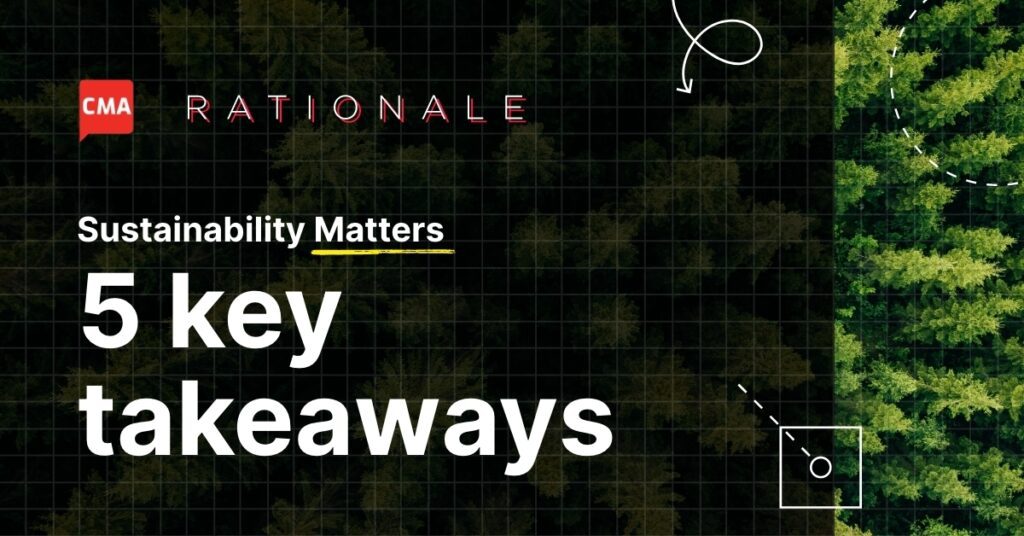Why should brands face their environmental impact and take a stand on climate change and sustainability? Because it matters.
We have collected five key takeaways from Rationale’s recent webinar ‘Sustainability matters’ with the CMA, to outline how to approach surfacing a corporate purpose that is authentic, builds trust and, most importantly, prioritises sustainability.

5 key takeaways:
1. What do we mean by sustainability?
Your business needs to strive for what we call ‘true’ sustainability. This means the kind of sustainability that doesn’t just take the environment into consideration but society and the economy too, a kind of sustainability that aims to mitigate the impact of all corporate activities across each of these three factors.
‘People lose sight of the power of businesses and brands to make change.’ – Rowan Morrison
2. The private sector has power
The stark fact is that the private sector is one of the biggest contributors to climate change. But this also means that the private sector has immense power and influence (not forgetting money) to bring about change. We can forget that businesses are made up of individuals, and many of individuals that care about their impact on the world. When people are motivated to make a change and are pushing for their employers to put in place the steps to address their negative impact on the environment, backed up by the right objectives and actions, this collective action in the private sector could make a fundamental difference to all of our futures.
3. Consumers are changing their behavior
In 2021, one in three consumers claimed to have stopped purchasing certain brands or products because they had ethical or sustainability related concerns. Prioritising purpose and sustainability is not just consumer lip service. Although brand purpose might be trumped by core drivers like price and quality, it is increasingly playing a more meaningful role in a matrix of influences to decisions. People are realising that their purchasing power can make a difference. And they are aligning more with (and putting their money more and more into) companies that are seen to be doing something ethical and responsible in relation to climate change.
“It’s not enough to say what you’re doing, you have to say why you’re doing it – it’s that which will make an emotional connection with your audiences.” – Svein Clouston
4. Sustainability can be your competitive advantage
Sustainability can be the thing that differentiates you from your competitors. Taking action against climate change and communicating this to your audiences genuinely can be the thing that tips people towards choosing your brand over others. As always, authenticity is the most crucial thing to avoid any backlash – anything you say must be backed up with action. Doing this will build trust over the long term, and positively impact your brand perception, loyalty and bottom line too.
“Whether you’re prioritising sustainability because you care, or because you want to increase footfall – just do it, because it’s important.” – Rowan Morrison
5. Make sure you surface proofpoints
Brand purpose in and of itself is pointless. It needs to form part of a wider strategy, it needs to be pinned to action, and you need to be able to prove what you say. This means avoiding being reactive, facing the mistakes of your past, setting a roadmap that acknowledges honestly to your audiences that you’re on a journey, and aiming to make meaningingful organisational change that brings about a wider, positive impact on the environment.
To find out more about what Rowan and Svein have to say about sustainability and brand purpose, you can watch the full webinar here, access their recent manifesto here, or visit Rationale’s website.






